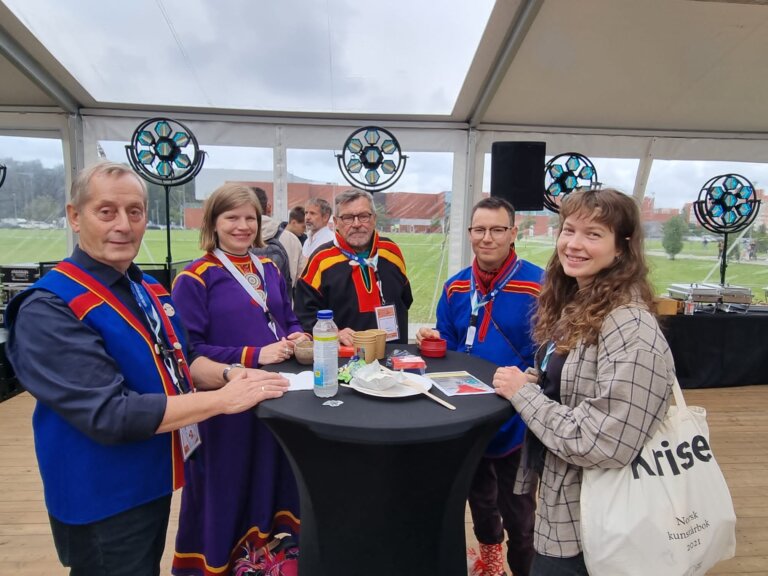UiT - The Arctic University of Norway, Indigenous Voices
WP5 Lead: Jan Erik Henriksen , prof. UiT, Indigenous Voices
jan.e.henriksen@uit.no
Indigenous knowledge-informed coastal resources management and conservation strategies embedded in a multi-actor approach
Overview & Objectives
WP5 will co-develop future marine resources management and governance options informed by TEK, scientific and local knowledge through multi-stakeholder dialogue to address evolving fjord ecosystems, building on the work of WP2. The WP aims to empower Sámi coastal communities to actively participate in and advocate for Sámi needs in ecosystem-based management processes and stewardship of marine resources in their traditional territories. Two policy papers will be developed that can inform Sámi rightsholders, local stakeholders, and policy makers in environmental decision-making processes on marine environments.
Co-develop future marine resource management and governance options informed by traditional ecological knowledge (TEK), scientific and local knowledge through multi-stakeholder dialogue.
Empower Sámi coastal communities to actively participate in and advocate for Sámi needs in ecosystem-based management processes and stewardship of seal populations and marine resources in their traditional territories.
Develop a policy paper on seal that can inform Sámi rightsholders and policy makers in environmental decision-making processes on marine environments.

Co-develop future marine resource management and governance options informed by traditional ecological knowledge (TEK), scientific and local knowledge through multi-stakeholder dialogue.
Empower Sámi coastal communities to actively participate in and advocate for Sámi needs in ecosystem-based management processes and stewardship of seal populations and marine resources in their traditional territories.
Develop a policy paper on seal that can inform Sámi rightsholders and policy makers in environmental decision-making processes on marine environments.
Activities & Relational Methods
Task 1: Co-design future management strategies for red king crab and pink salmon and related marine ecosystem conservation strategies in the Varanger fjord. Organize multi-actor workshops involving local fishing organizations, researchers, and governmental bodies such as the Norwegian Ministry of Fish, Industry and Trade, Ministry of Climate and Environment, Directorate of Fisheries, Norwegian Environment Agency, and the Sámi Parliament to deliberate on current management options and determine future scenarios for pink salmon and red king crab management in light of environmental changes. Identify critical factors, challenges, and opportunities to inform decision-making regarding the environmental management of invasive species and marine ecosystem restoration in the Varanger fjord
Task 2: Design Sámi Indigenous knowledge-informed management and conservation of seal populations. Assess Sámi Indigenous knowledge and priorities concerning the management and conservation of seal populations, through Sámi community workshops, aimed at empowering communities to co-design Sámi knowledge-informed management and conservation strategies.
Task 3: Synthesis of results and policy recommendations report writing for inclusive marine resources management and conservation. Generate 2 policy recommendation reports: a) Policy recommendations report addressing challenges associated with pink salmon as well as the restoration of fjord ecosystems, b) Policy brief on seal-related knowledge in coastal Sápmi to inform decision making regarding seal management.
Expected Outcomes & Impact
Report with policy recommendations – on sustainable management options for pink salmon. Focus on enhancing prospects for sustainable fisheries, marine conservation
mi community/Varanger fjord. Report is accompanied by audio-visual formats.
Policy brief on seal-related knowledge in coastal Sápmi to inform decision making regarding seal management.
Personnel
Research Areas
Click each place to read more
Varanger is a vital Birgejupmi site facing climate, ecological, and green transition challenges. It supports Sámi marine knowledge, inclusive governance, and local empowerment through Indigenous-led resilience efforts.
Porsáŋgu/Porsanger is a key Birgejupmi site facing climate-driven ecological shifts. With Mearrasiida as a knowledge hub, the community revitalizes seal practices through workshops, supporting Sámi traditions, resilience, and sustainable coastal stewardship.
Unjárga/Nesseby is a key Birgejupmi site where Sámi knowledge and youth co-design shape climate, marine, and invasive species research. Workshops and exhibitions explore future visions and assess wind energy’s cultural impacts, supporting Indigenous resilience and adaptation.
News & Publications from Work Package 5
Stay updated with the latest publications from this work package, including news articles, reports, and research summaries.
